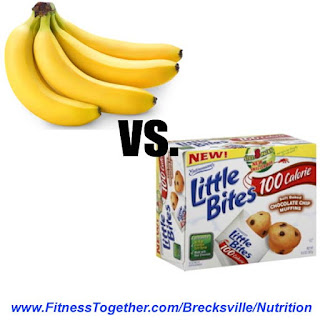Quality
vs. Quantity
Posted
By: Fitness Together | Alexandria on 08/18/2015
Fewer calories isn't always the way to go...
For example, take a
100-calorie snack pack of mini muffins and a 120-calorie banana. Which would
you choose?
The logical choice would
be the healthy banana, but by only considering the calories one would choose
the mini muffins. The tricky thing is what really is the healthiest snack
choice?
The banana, however,
contains natural sugars and proteins that your body breaks down and uses as
fuel and energy, rather than storing it as fat. Also, by eating healthy foods
your mind is healthier and happier and you often feel more motivated.
There have been many
studies that show whether or not a calorie is simply a calorie, no matter what
food it is from, and if every calorie that is eaten is the same. Is a calorie
just a calorie? Many people assume that the only variable when it comes to food
and weight loss is the amount of calories you intake, which completely ignores
the role of macronutrients such as protein, starch, and fat in the weight loss
process.
A specific study shows
three people’s eating habits over a two-week span. One subject had a low
protein diet, one with a medium protein diet and the other with a high protein
diet. If a calorie was a calorie, each subject should have gained the same
amount of weight as they were given the same amount of calories, just different
foods. Instead, the results showed that the subjects who ate on a moderate to
high protein diet built muscle and healthy fat, while the person who ate a low
protein diet built mostly fat. The low protein subject gained less total
weight, but what he gained was almost exclusively fat. This study showed that
changing macronutrients does affect weight gain and fat loss even in the presence
of poor food quality. If more attention had been paid to where the calories
came from, it’s likely the results would have been different.
Other studies also have
shown that not getting enough sleep or being stressed out can affect your
metabolism and ultimately your ability to lose weight. First of all, when you
are tired and stressed out your mind most commonly desires comfort food, which
we all know is not typically fruits and veggies. By getting enough sleep and
regulating your stress levels, your mind can be able to be awake and healthy.
Your body also responds to sleepless nights and stressful occurrences by
increasing cortisol levels, which are hormones that slow down your metabolism.
You should also keep in
mind that simple exercise and healthy eating is just plain good for you! Making
healthier food choices and being more physically active will help you feel
better, sleep better and feel less stressed. Managing calories and what you eat
is one thing, but practicing common health habits is a great start in taking
charge of your health and your life.
©
2015 Fitness Together, Inc. All Rights Reserved. Powered by Fusionbox.
About | Contact | Franchise | Suppliers | History | Leadership | NutritionTogether |Sitemap | PrivacyPolicy | TermsofUse | Facebook | YouTube | Twitter | Linkedin


